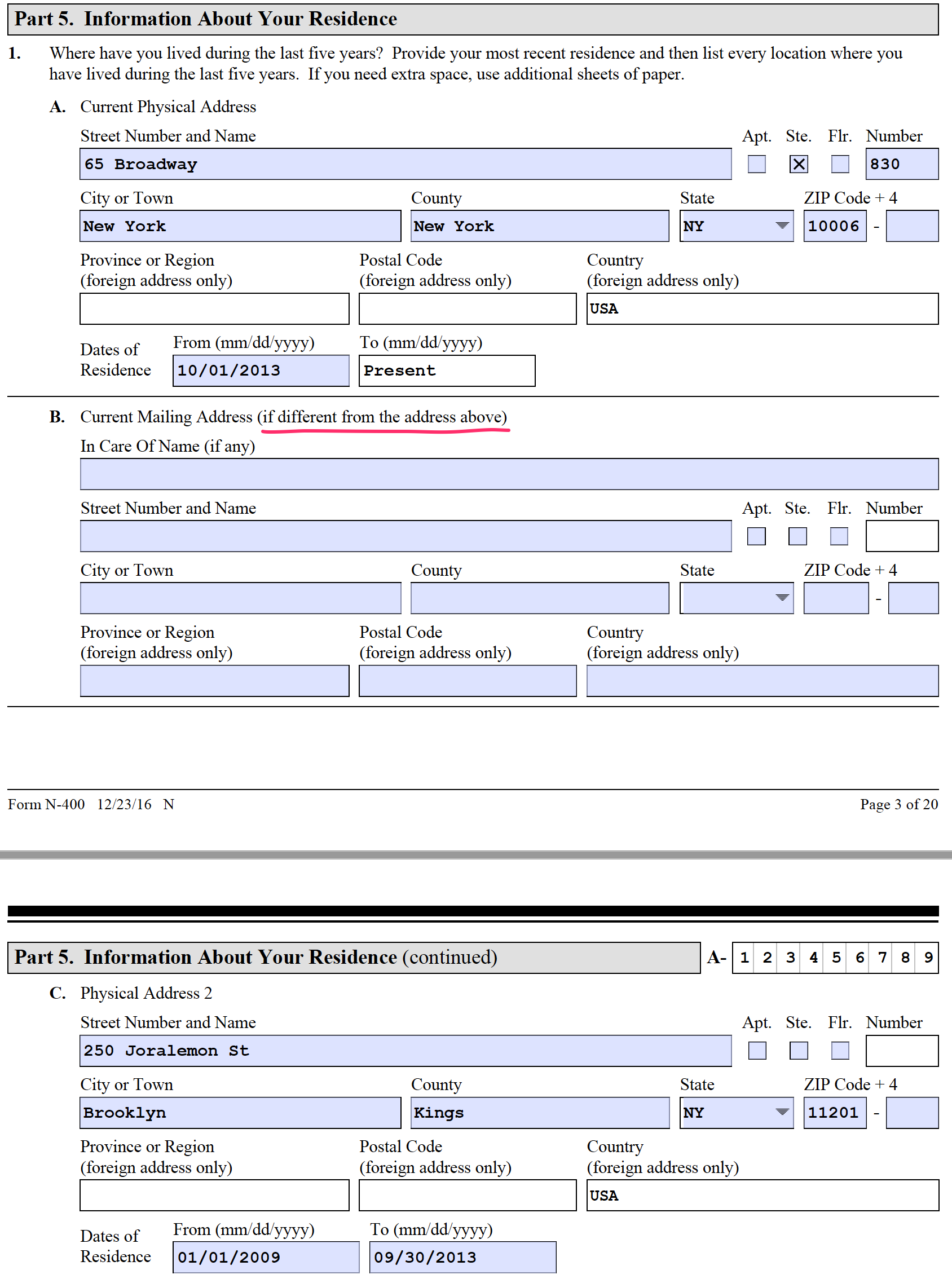Part 5. Information About Your Residence.
- A. Current Physical Address: USCIS asks you to list both your home address and your mailing address. Write your current physical address, regardless of whether you receive mail there. Do not put a post office (P.O.) box number here. If your address includes a space or lot number, enter this information in the “Street Number and Name” field. If you have been living at a shelter, government or social organization service facility, you may list that address as confidential. Instead, you can provide a different address where you can receive mail OR write that the address is “confidential” and provide only the city and state. If you do not know the zip code plus the extra four numbers, leave the four-number field blank.
Attention: There is one field for “county” and a different field for “country”. Do not confuse the two. For example, in New York City, the counties are Kings, The Bronx, Queens, New York and Richmond.
- B. Current Mailing Address: The mailing address is where USCIS will send you the notice to appear for fingerprinting appointment (biometrics) and for the naturalization interview. If your mailing address is the same as your home address, write ‘SAME’. If it is different, write your mailing address. If you think you will be moving while your application is being processed, use the mailing address of a friend or relative. This is important because mail from USCIS will not be forwarded to your new address when you move. Not receiving your mail from USCIS may result in you missing your biometrics and interview appointment notices and having your application denied. If you use the mailing address of a friend or relative, in the “Care of” box write the name of the person who will be receiving the mail for you. If you are represented by an attorney, the attorney will also receive the notices mailed by USCIS.
Part 5 – C.D.E. – Write your addresses starting with where you currently live (Part 5.1.A) and going backward. List every address where you have lived in the last five years including in other countries (NOTE: Vacation homes you stayed at whether in the US or abroad do not need to be listed. They are not considered homes you have lived in for USCIS purposes.) Write in the “Dates of Residence From” field the date on which you moved to that address from the previous address. If you got your green card through marriage, expect USCIS to compare the addresses listed with those on joint taxes and bank accounts. If you do not know your additional four-digit zip code you may leave it blank or write “0000”. If you need additional space to list all your residences, attach a separate sheet of paper. Make sure to sign and date the sheet.
KEY CONCEPTS OVERVIEW
Continuous Residence means that you have not left the United States for a long period of time. If you leave the United States for too long, you may interrupt your continuous residence. Continuous residence concerns the time you resided lawfully in the United States without any single absence long enough to “break” that continuity for naturalization purposes.
Physical Presence means that you have actually been in the United States. Most applicants must be physically present in the United States for a certain number of months to be eligible for naturalization. Physical presence concerns the total number of days you were in the United States during the period required for your naturalization.
Time as a Resident in a USCIS District or State: Most people must live in the USCIS district or State in which they are applying for at least 3 months before applying. A district is a geographical area defined by USCIS and served by one of the USCIS “District Offices.”









Hello,
What do I do if I do not have any children? Should I type “0” or “none”? In child information should type “N/A” in each field?
Thank you,
Best Regards,
Greg
Applicant must list all sons and daughters alive, deceased, missing, adopted, or stepchildren, even if they are U.S. citizens, adults, married, or live outside the United States. If you do not have any children simply type “0” in Part 11 item number 1 and do not type anything else in part 11. Please consider our attorney document review service. For only $249 an attorney will review your completed N-400 form for eligibility, errors, omissions, inconsistencies and other mistakes.
Thank you so much for the sample.My Sister was married to US Citizen and She has stayed in US for 3 years she was in Nepal before she Entered US and never traveled anywhere.Do i need to fill part 9 (Time outside US for past 5 years )? What should be the number of trips then ?
Based on the information you’ve provided if the applicant eligibility is based on being married to a US citizen for 3 years and no trips were taken outside the US from the time she received her conditional residence then she should mark 0 in part 9.1 and 9.2. Please keep in mind I am basing this on the information you’ve provided. In order to definitively reply I would have to review the entire application and the underlying eligibility. We provide an affordable application review service where we check for mistakes, omissions and inconsistencies. Feel free to contact our office to discuss this service.
Hello,
Thanks for very helpful simple.
I was divorced before I come to Usa 5 years ago. do I have to make sign on divorce? and need to bring my divorce certificate from my country?
thank you
Unfortunately, I do not have enough information to reply to your question. Please feel free to call me or write me an email detailing your situation and question.
I work from home in IL. I file my taxes in IL but I work from a company where the headquarters is based in NJ. Should I write the headquarters as address of my employer? On my income tax return, the address of the employer is different from the headquarter’s address. Should I write the address on the income tax return as my address?
If I note my employer’s address in NJ, can I be denied from US citizenship since I’m filing at IL. But I do file taxes in IL.
Thanks so much for this helpful information!
Krissy
Hi Krissy,
I cannot answer to your specific situation because I would need much more information to provide an accurate individual answer. But in general, a citizenship application will not be denied because of an address of an employer. Some corporations have many locations in different states. It is not a material issue. Please note that just because I answered your question it does not establish an attorney-client relationship. Please feel free to email or call me if you have further questions.
Thanks so much for your reply! I really appreciate it! I will definitely recommend you guys to my friends and family who needs extra help with their applications.
So if I only have 1 child, do i need to just leave blank the rest ( child 2-4). A little of confuse If I have to put N/A on all questions not applicable to me.
Yes, if you only have 1 child you leave the remaining sections blank. You do not need to put N/A on all questions not applicable to you. Please feel free to email me if you have further questions or would like me to review your entire application.
Hi, im married with my citzen usa husband more than 5 years an i have my permanent green card for more thand five years as well, i have all the requirements for became citizen. I need help to choose my eligibility in the form N 400. Part 1. Should i choose box “A” or box “B”? Should i go under 5 years lawful permanent resident or under at least 3 years and aditional married at least 3 years?
Hi, I cannot specifically tell you what option to choose because you are not my client. But in a situation where a permanent resident is eligible for citizenship under both the 3 years married to a US citizen and 5 years permanent resident requirements then choosing the 5-year permanent resident option is better because it does not require to submit marriage related evidence. I hope this answers your question. Please consider my N-400 review service in order to make sure your application is filed properly and avoid any rejections or delays.
Thank so much for your reply!
Hi, im married with my usa citzen husband more than 5 years an i have my permanent green card for more thand five years as well, i have all the requirements for become citizen. I need help to choose my eligibility in the form N 400. Part 1. Should i choose box “A” or box “B”? Should i go under 5 years lawful permanent resident or under at least 3 years and aditional married at least 3 years?